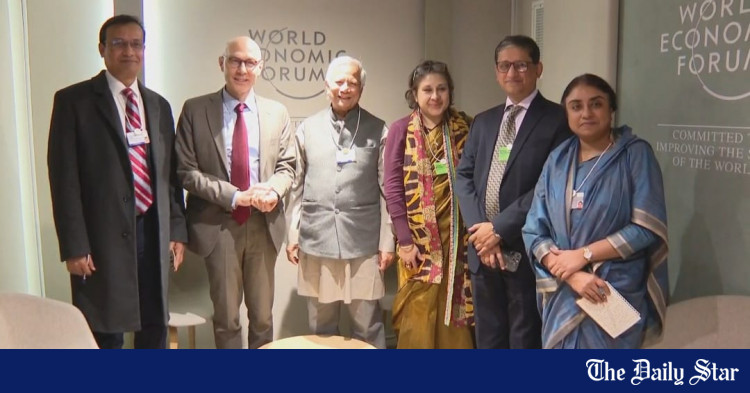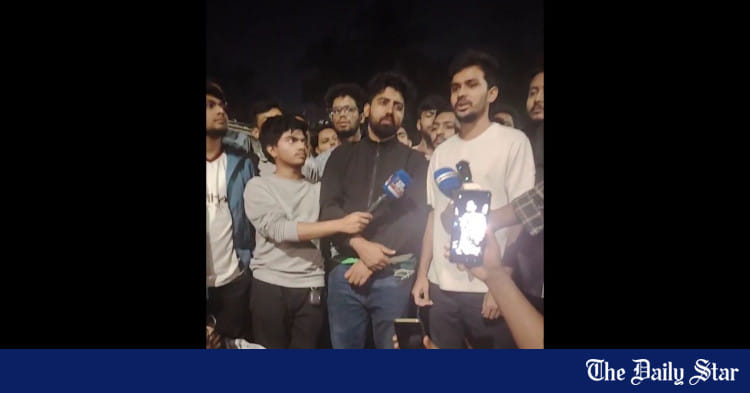Saif
Senior Member
- Joined
- Jan 24, 2024
- Messages
- 16,790
- Likes
- 8,152
- Nation

- Residence

- Axis Group


JULY UPRISING PROCLAMATION: Political parties suggest draft committee
Political parties on Thursday urged the interim government to form a committee to prepare the text of the July uprising proclamation on the basis of a consensus through detailed discussion with all anti-fascist forces...
 www.newagebd.net
www.newagebd.net
JULY UPRISING PROCLAMATION: Political parties suggest draft committee
Staff Correspondent 17 January, 2025, 00:09

Chief adviser Muhammad Yunus holds a meeting regarding the formulation of the July proclamation with leaders of different political parties at the Foreign Service Academy in Dhaka on Thursday. | Focus Bangla photo
Political parties on Thursday urged the interim government to form a committee to prepare the text of the July uprising proclamation on the basis of a consensus through detailed discussion with all anti-fascist forces.
At a meeting with the chief adviser Professor Muhammad Yunus, leaders of the political parties also proposed that the government, based on the consensus, would have to decide whether it would be a proclamation or declaration and what would be its legal significance.
The government held the meeting with political parties at the Foreign Service Academy in the capital on the draft of the July uprising proclamation.
Most of the political parties and forces in favour of the July uprising, including the Bangladesh Nationalist Party, the Bangladesh Jaamat-e-Islami, the Ganatantra Mancha and the Nagorik Committee, joined the meeting.
Leaders from 14 political parties, including the Communist Party of Bangladesh, Bangladesher Samajtantrik Dal and the 12-party alliance, skipped the meeting, citing reasons such as inadequate time, lack of proper preparations, and issues with the invitation process.
Chief adviser Professor Muhammad Yunus told the meeting that the interim government would take the nation forward through unity.
He said, ‘...because the government was born amid unity; it was created through unity. When we work alone and see no one is beside us, we feel a bit weak. And when you all sit together, we get courage in mind that we remain united. We were born amid unity and unity is our strength.’
Yunus said that the government was rejuvenated through unity.
He recalled a moment when the student leaders of the July revolution approached him, expressing their intention to make a declaration—the July Proclamation.
‘I tried to understand what kind of proclamation they were planning. I told them it wouldn’t happen as they envisioned it,’ the chief adviser said.
He advised the students to involve all stakeholders of the July revolution in the process of the preparation of the proclamation.
The chief adviser highlighted that the purpose of the meeting was to finalise the July Proclamation with collective agreement. He stated that if a consensus could not be achieved, there would be no need to announce it.
Following the meeting, BNP standing committee member Salahuddin Ahmed said that they questioned the necessity of announcing the July proclamation five months after the mass uprising.
‘If there is any necessity, we must first determine the political, historical, and legal significance of the declaration so that no division can arise among the anti-fascist forces while preparing the proclamation,’ he said.
If a political document becomes a historical one, the BNP certainly respects that document, Salahuddin said.
The BNP leader said that he discussed at the meeting the significant challenge of moving the nation forward through unity among the anti-fascist forces.
Jaamat secretary general Mia Golam Parwar said that they agreed about the July Proclamation and the document should be prepared based on the opinions from all the parties.
The meeting did not reach a decision on the proclamation, but it resolved to hold further discussions on the issue.
Golam Parwar stated that his party had received a draft of the proclamation from the government but they could not thoroughly review the text due to time constraints.
The meeting discussed forming a committee to prepare an initial version of the proclamation, he said.
All parties will then provide their input on the draft and ultimately, a final version will be prepared, incorporating the chronology of Bangladesh’s history, the Jammat leader said.
Ganosamhati Andolan chief coordinator Zonayed Saki said that they discussed the possibility of the announcement of a declaration that would reflect the aspirations of the people and uphold the spirit of the July uprising.
The government will have to determine the nature of the announcement, whether it would be a proclamation or a declaration, and what would be its legal aspects, he said.
Saki said that the meeting decided to form a committee and the committee would prepare a declaration through discussions with all the anti-fascist forces.
At a briefing after the meeting, law adviser Asif Nazrul said that as per the discussion of the meeting further meetings on the July uprising proclamation would take place and a committee might be formed to take the work forward.
He said that all the parties agreed on the formulation of the July Uprising Proclamation and the parties suggested that in essence, everyone’s contribution should be mentioned in the declaration and it should be clarified what the political or legal nature of the declaration will be.
Asif Nazrul said that more emphasis was placed on formulating the declaration through unanimous agreement, achieved by engaging in discussions with political forces, students and the public supporting the July uprising.
‘As much time as necessary can be taken for this process. However, there should be no unnecessary delays or time wastage. Everyone has agreed that such a declaration should be crafted through more intensive discussions, ensuring a consensus,’ he said.
Responding to a question Asif Nazrul said that no distance was created with political parties regarding the July proclamation rather there were merely differing opinions on how this should be done.
‘We see no signs of disagreement; instead, everyone has expressed that this declaration should reflect collective ownership,’ he added.
Earlier on December 30, the government announced that they would prepare the July Uprising Proclamation with a consensus as the Students Against Discrimination decided to announce a proclamation of the uprising at Central Shaheed Minar in Dhaka on December 31.
Following the government announcement the student leaders turned their programme to ‘March for Unity’ and demanded July proclamation from the government by January 15.
Staff Correspondent 17 January, 2025, 00:09
Chief adviser Muhammad Yunus holds a meeting regarding the formulation of the July proclamation with leaders of different political parties at the Foreign Service Academy in Dhaka on Thursday. | Focus Bangla photo
Political parties on Thursday urged the interim government to form a committee to prepare the text of the July uprising proclamation on the basis of a consensus through detailed discussion with all anti-fascist forces.
At a meeting with the chief adviser Professor Muhammad Yunus, leaders of the political parties also proposed that the government, based on the consensus, would have to decide whether it would be a proclamation or declaration and what would be its legal significance.
The government held the meeting with political parties at the Foreign Service Academy in the capital on the draft of the July uprising proclamation.
Most of the political parties and forces in favour of the July uprising, including the Bangladesh Nationalist Party, the Bangladesh Jaamat-e-Islami, the Ganatantra Mancha and the Nagorik Committee, joined the meeting.
Leaders from 14 political parties, including the Communist Party of Bangladesh, Bangladesher Samajtantrik Dal and the 12-party alliance, skipped the meeting, citing reasons such as inadequate time, lack of proper preparations, and issues with the invitation process.
Chief adviser Professor Muhammad Yunus told the meeting that the interim government would take the nation forward through unity.
He said, ‘...because the government was born amid unity; it was created through unity. When we work alone and see no one is beside us, we feel a bit weak. And when you all sit together, we get courage in mind that we remain united. We were born amid unity and unity is our strength.’
Yunus said that the government was rejuvenated through unity.
He recalled a moment when the student leaders of the July revolution approached him, expressing their intention to make a declaration—the July Proclamation.
‘I tried to understand what kind of proclamation they were planning. I told them it wouldn’t happen as they envisioned it,’ the chief adviser said.
He advised the students to involve all stakeholders of the July revolution in the process of the preparation of the proclamation.
The chief adviser highlighted that the purpose of the meeting was to finalise the July Proclamation with collective agreement. He stated that if a consensus could not be achieved, there would be no need to announce it.
Following the meeting, BNP standing committee member Salahuddin Ahmed said that they questioned the necessity of announcing the July proclamation five months after the mass uprising.
‘If there is any necessity, we must first determine the political, historical, and legal significance of the declaration so that no division can arise among the anti-fascist forces while preparing the proclamation,’ he said.
If a political document becomes a historical one, the BNP certainly respects that document, Salahuddin said.
The BNP leader said that he discussed at the meeting the significant challenge of moving the nation forward through unity among the anti-fascist forces.
Jaamat secretary general Mia Golam Parwar said that they agreed about the July Proclamation and the document should be prepared based on the opinions from all the parties.
The meeting did not reach a decision on the proclamation, but it resolved to hold further discussions on the issue.
Golam Parwar stated that his party had received a draft of the proclamation from the government but they could not thoroughly review the text due to time constraints.
The meeting discussed forming a committee to prepare an initial version of the proclamation, he said.
All parties will then provide their input on the draft and ultimately, a final version will be prepared, incorporating the chronology of Bangladesh’s history, the Jammat leader said.
Ganosamhati Andolan chief coordinator Zonayed Saki said that they discussed the possibility of the announcement of a declaration that would reflect the aspirations of the people and uphold the spirit of the July uprising.
The government will have to determine the nature of the announcement, whether it would be a proclamation or a declaration, and what would be its legal aspects, he said.
Saki said that the meeting decided to form a committee and the committee would prepare a declaration through discussions with all the anti-fascist forces.
At a briefing after the meeting, law adviser Asif Nazrul said that as per the discussion of the meeting further meetings on the July uprising proclamation would take place and a committee might be formed to take the work forward.
He said that all the parties agreed on the formulation of the July Uprising Proclamation and the parties suggested that in essence, everyone’s contribution should be mentioned in the declaration and it should be clarified what the political or legal nature of the declaration will be.
Asif Nazrul said that more emphasis was placed on formulating the declaration through unanimous agreement, achieved by engaging in discussions with political forces, students and the public supporting the July uprising.
‘As much time as necessary can be taken for this process. However, there should be no unnecessary delays or time wastage. Everyone has agreed that such a declaration should be crafted through more intensive discussions, ensuring a consensus,’ he said.
Responding to a question Asif Nazrul said that no distance was created with political parties regarding the July proclamation rather there were merely differing opinions on how this should be done.
‘We see no signs of disagreement; instead, everyone has expressed that this declaration should reflect collective ownership,’ he added.
Earlier on December 30, the government announced that they would prepare the July Uprising Proclamation with a consensus as the Students Against Discrimination decided to announce a proclamation of the uprising at Central Shaheed Minar in Dhaka on December 31.
Following the government announcement the student leaders turned their programme to ‘March for Unity’ and demanded July proclamation from the government by January 15.




